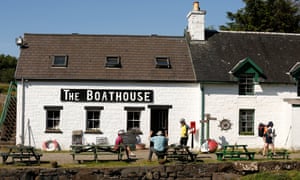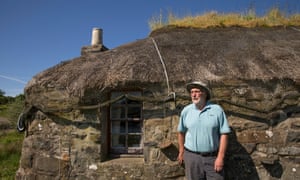Soon after he had clambered aboard Ulva’s petite silver-hulled ferry, Simon Marvin shared a guilty secret. He had bought a lottery ticket as soon as he heard the Scottish island was up for sale. Just in case.
“We bought a lottery ticket just to see if we could buy it, but only as a bit of fun,” he confessed, as the ferry was steered towards Ulva’s rocky, tree-lined shore, before his partner, Nicola Turner, hastily added: “That was before we knew it was a community buyout.”
The couple from Stockport and their friends Maria Mroz and John Pendlebury were on their 13th visit to Ulva, snared by its tranquility, landscape and the “absolutely stunning” locally caught prawns, trapped in creels along with brown crab and lobster around Ulva’s coast.
Like many other of the island’s aficionados who return every year, they regarded Ulva as a closely held secret. “It’s just incredibly beautiful,” Mroz said.
After decades of relative anonymity compared with its far better known neighbouring island of Mull, Ulva has become famous. In March it joined a small, privileged club of Hebridean islands owned by its residents after the Scottish government approved and largely funded a £4.6m community buyout.
On 21 June, its five islanders and their allies in the local community forestry company that oversaw the buyout will take the keys to Ulva’s properties and its title deeds, ending centuries of private ownership and, they hope, reversing decades of underinvestment and depopulation.
Its new owners will cut a ceremonial ribbon at the Boathouse, the island’s white-walled seafood restaurant sitting beside Ulva’s slipway.

When it went on sale last year with a guide price of £5m, the global property firm Knight Frank told prospective buyers the 2,000-hectare island was “one of the finest private islands in Europe”. The brochure boasted of its deer stalking, fishing, yacht moorings and a private airstrip on nearby Mull.
Just before Marvin and his group arrived to catch Ulva’s ferry, the current owner, Jamie Howard, had been stacking removal boxes in a garage by the pier. The Scottish government’s decision to stop Ulva’s sale on the open market prevented a possible bidding war by private buyers, ending hopes of a windfall. Howard’s agents believe publicly funded buyouts are risky, scaring off investors.
Not everyone was put off. John Ritchie, on holiday from Edinburgh with his friend Helen Fenton, had the same idea as Marvin when he heard Ulva was for sale. “I was frantically buying Euromillions tickets. If I had [won], I would’ve bought the whole lot,” Ritchie said. Unlike Marvin, he kept buying tickets, suspecting the buyout would fail.
Ritchie’s great-grandmother, Grace Macquarrie, had left the island aged nine in 1868, when her family was, he believes, evicted by its then owner to make way for sheep.
With the help of records kept by Barry George, one of the five islanders, Ritchie believes he traced Macquarrie’s home to Ormaig, one of the ruined townships dating to when Ulva was home to 600 people 200 years ago, its population swollen by the kelp harvesting industry.
Ormaig was the birthplace of Ulva’s most famous emigré, Lachlan Macquarie, the British officer who became governor of New South Wales in Australia. Infamous for his harsh, repressive treatment of the Aboriginal population, Macquarie is also regarded by some as the father of Australia, a colonial reformist and visionary.
John Addy, a director of the North West Mull Community Woodland Company which will shortly own Ulva, hopes the Australian connection will attract a fresh wave of visitors and donors to help fund the heavy cost of renovating and perhaps rebuilding Ulva’s six dilapidated homes, its church and manse, both designed by the engineer Thomas Telford, and its bothies.
The company has raised £37,230 towards its ongoing costs from a crowdfunding campaign.

It estimates each home may cost up to £80,000 to upgrade and refit, with some needing to be gutted and rebuilt. Ardalum House, which is earmarked as a hostel and campsite, needs a new roof, and the church is leaking. Eventually, plots will be earmarked for new homes – Addy believes up to 50 people could live there.
The government-funded Scottish Land Fund, administered by the Big Lottery, has set aside £140,200 to hire a development officer – who will oversee the renovations, its housing and economic development strategy – as well as a part-time housing renovation officer and administrative support.
Building surveyors are lined up to inspect the properties, and the search is on for contractors to survey the slipways and Ulva’s reservoir, which supplies its drinking water.
There has been a flood of proposals for future projects: a record producer in the US has suggested an artists’ retreat; others have proposed an oyster farm; tele-crofters could set up online businesses or run horse riding; a cyclists’ route could circumnavigate the island.
“We’re aware of the challenges, but we’re also aware of the incredible opportunities,” Addy said.
Rebecca Munro, who runs the Boathouse restaurant with her sister-in-law Emma, the daughter of Ulva’s ferryman, Donny Munro, hopes that once the hostel and a B&B are up and running restaurant trade will double to perhaps 10,000 visitors every summer.
But at this stage she admits the task ahead is “terrifying”. They had campaigned for the right to buy Ulva, to finally have security of tenure. Now they have to provethey can do it.
“We were never under any illusions this wasn’t going to be hard. But we are part of the group that’s in control,” she said.
Francois Georges, a retired human resources director from Paris, helped with the crowdfunding, adding €100 (£88) to the pot. With a large group of friends who travel across from Burgundy, Brussels and Cyprus, Georges has visited Ulva every second spring for 25 years during their annual pilgrimage to Mull.
“I don’t like the idea of other people buying this island. The island belongs to the people who are here,” he said. Raphael Mattei, another Parisian in the group, interjected: “We are in love,” he said, to much nodding from his friends.